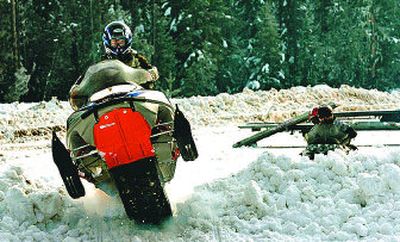Snowmobiling area ruled off-limits

A popular backcountry snowmobiling area north of Upper Priest Lake has again been ruled off-limits to snowmobiles in an effort to protect the Lower 48’s last herd of caribou.
Wednesday’s ruling from the bench by U.S. District Judge Robert Whaley applies only to the relatively remote Trapper Burn area. Snowmobiling remains open on hundreds of miles of groomed trails that ring Priest Lake.
The Trapper Burn area is a critical migration route between Idaho and British Columbia for caribou, according to expert testimony offered by environmental groups during a federal trial earlier this week in Spokane. Growing snowmobile traffic is keeping caribou from using the route and preventing the endangered ungulates from reversing their rapid plunge toward extinction, according to the testimony.
Although Whaley issued a ruling Wednesday that closed the area, the exact boundaries were still being worked out, said Laurie Rule, a Boise-based attorney for Advocates For the West, who represented the Selkirk Conservation Alliance in the case.
“We’re very pleased with the ruling,” Rule said. “It’s the main corridor that would allow the animals in Idaho to go back and forth to Canada.”
Groomed trails don’t cross the wide expanse of the Trapper Burn, but it’s a popular backcountry play area for snowmobile enthusiasts, said Tim Piver, a rider from Deer Park.
“That will be a major loss,” he said. “It’s a compromise I’m not willing to step aside for.”
Piver frequently rides through the area, drawn by the opportunity to race through the treeless powder. “I have never seen a track from a large game animal in there ever,” Piver said.
The fight over snowmobile access to the federal land around Priest Lake has resembled a pingpong match recently. Last season, Whaley banned grooming on the trails but allowed riding to continue. In September, environmentalists rejoiced and snowmobilers howled after the judge banned all snowmobiling on about 300,000 acres of federally designated caribou recovery area west and north of Priest Lake. But before snow fell, Whaley reopened most of the area to motorized sports.
Environmentalists then argued successfully for a new trial on the issue, which began Monday and concluded Wednesday.
Fewer than 40 caribou live in the temperate rain forest north of Priest Lake. Most of the animals are believed to be in Canada, but they wander back and forth across the border.
Mark Sprengel, director of the Selkirk Conservation Alliance, said that protecting migration corridors for caribou, such as the Trapper Burn, increases the chances of interbreeding between herds, which is vital for the long-term survival of the species.
“Unless we ensure caribou have unimpeded movement throughout the recovery area, they’re doomed to extinction,” Sprengel said. “Caribou should be given the benefit of the doubt.”
Snowmobilers say logging of old growth forest and increased predator populations have done more to harm caribou than the sound of their machines. Businesses in the Priest Lake area say last year’s grooming ban resulted in millions of dollars of lost business.